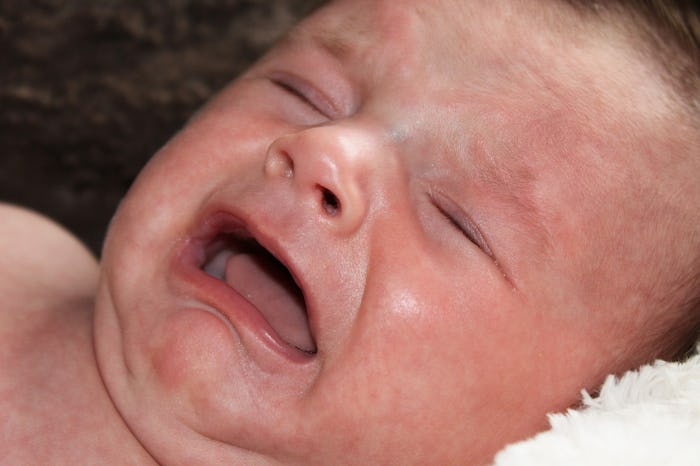Most babies, whether they are breastfed or formula fed, will spit up at some point. There is a big difference, however, between spitting up and vomiting. The former doesn't interfere with a baby's well-being, while the ladder can be a sign of a serious problem. It's important for you, as a parent, to understand the reasons for your baby's projectile vomiting so that you don't hesitate in seeking immediate medical treatment.
Many new parents aren't quite sure of the difference between vomiting and spitting up. Spitting up is the easy flow of a baby's stomach contents through their mouth, possibly along with a burp. As the Mayo Clinic noted, however, when the flow is forceful and shoots out inches instead of dribbling from the mouth, this is considered vomiting. Sometimes a baby can have such a forceful ejection, that the breast milk or formula is released in an arc over a distance of many feet. According to Kids Health From Nemours, projectile vomiting usually takes right after the end of a feeding, but in some cases it can happen hours later and may be a sign of illness.
Here are some of the reasons your baby may be projectile vomiting.
1They Have Pyloric Stenosis
Pyloric stenosis, also called infantile hypertrophic pyloric stenosis, is the thickening of the muscle at the stomach exit. According to Kids Health From Nemours, this is a type of gastric outlet obstruction, or blockage from the stomach to the intestines that can develop three to five weeks after birth. The stomach of a baby with pyloric stenosis will not be able to empty properly, which can result in projectile vomiting. This condition must be treated by surgery.
2The Suffer From GERD
According to the American Academy of Pediatrics (AAP), GERD or gastroesophageal reflux disease, is a condition that occurs when the muscles at the lower end of a baby's esophagus become overly relaxed and allow the stomach contents to back up. This condition can be controlled by thickening of the milk with small amounts of baby cereal as directed by your pediatrician, smaller and more frequent feedings, frequent burping, and leaving your baby in a safe, quiet, upright position for 30 minutes after feeding.
3You Have A Breast Milk Oversupply
If you have an overabundant milk supply and a forceful letdown, your baby may swallowing milk too quickly. This can bring excess air into their stomach causing them to bring back up the swallowed milk along with burp. The Mayo Clinic suggested moms seek medical attention any time your baby spits up forcefully, isn't gaining weight, spits up green or yellow fluid, spits up blood or a material that looks like coffee grounds, or has bloody stools.
4They Have An Infection
The aforementioned AAP article noted that as babies get older, the most common cause of vomiting is a stomach or intestinal infection. These infections can be caused by viruses, bacteria, or even parasites. Some infections require immediate medical treatment, so it's important to contact your doctor anytime your baby has vomiting.
5They Suffer From Motion Sickness
Although it's most common in kids aged 2 to 12, motion sickness can happen at any age, according to the Mayo Clinic. It is believed that motion sickness occurs when the brain receives conflicting information from the inner ear, eyes, and nerves of the extremities. This can cause disorientation and vomiting.
